#panchatantra stories
Explore tagged Tumblr posts
Text
#telugu moral stories#stories in telugu#moral stories in telugu#telugu stories#moral stories#fairy tale stories in telugu#telugu kathalu#telugu fairy tales#story in telugu#telugu fairy stories#stories in telugu with moral#fairy tales in telugu#panchatantra stories#telugu fairy tales stories#stores in telugu#stories telugu#latest telugu stories#new telugu stories#telugu story#panchatantra kathalu#panchatantra stories in telugu#telugu magical stories
0 notes
Text
Panchatantra Stories for Kids
Panchatantra Stories for Kids in English with Moral Values - Short Panchatantra story, Panchatantra folktales and important life lesson of The elephants and the mice, The monkey and the crocodile, The bird's golden droppings, The lion and the rabbit and The Lion that Sprang to Life Panchatantra moral story for children.

0 notes
Text
Shaapit Murti | शापित मूर्ति | Hindi Horror Stories | सच्ची कहानी | Horror Kahaniyan | Akshu Tv
हम सभी अपनी डेली लाइफ मै कई मूर्तिओं से रूबरू होते है! पर कभी अपने सोचा है की जो मूर्ति आपको मन मोहक और सुन्दर लगती है उस के अंदर कोई । आत्मा या कि��ी भयानक चुड़ैल का वास हो? सोच कर ही दिल देहल जाता है! ऐसा ही कुछ हुआ हमारी इस Horror Story कई एक रोमांटिक कपल के साथ जब वो एक मूर्ति अपने घर ले आएं! और उन्होंने महसूस किया की उनके साथ और कोई भी अब उसके साथ रहने लगा हैं! अगर आपको ये Hindi Horror Story अच्छी लगी तो वीडियो को लाइक जरूर करें, और हमारे चैनल Akshu Tv को सब्सक्राइब करें
youtube
Visit Us for More Videos:- https://www.youtube.com/@akshutvhorror/videos
#Akshu TV horror Stories#Hindi Horror Stories#Hindi Stories#Horror Stories#Suspense Stories#Hindi Kahaniya#Stories In Hindi#Hindi Animated Story#Kahaniya In Hindi#Panchatantra Tales#Bedtime Stories#Kahani#sachi kahaniya#Youtube
2 notes
·
View notes
Text
Business Majors should be legally required to take a course on Aesop's Fables every year.
The whole Reddit thing is an especially striking example of corporate brain rot because, like, they managed to build their entire business model on the back of exploiting vast quantities of unpaid volunteer labour, and successfully convinced the entire Internet that this is a normal state of affairs. How do you fuck that up? How do you convince yourself that instituting a de facto demand for your very nearly 100% volunteer workforce to pay you for the ability to use the tools that are required to do their job is anything other than cutting your own throat?
#prokopetz#The Dog and his Bone#Aesop's Fables#the joke of this is that Europe turned these into children's stories for some reason when they were originally a political treatise#The Panchatantra#reddit#Corporate Mismanagement#Capitalism#Capitalists#Idiocy#cantankerous reblogs#reblog replies#The Internet#Volunteerism
19K notes
·
View notes
Video
youtube
|| పిశాచిని ||
అనగనగా ఒక ముసలివానికి దైనా అనే ఒక కూతురు. అతనికి భార్య లేకపోవటం చేత కూతురే ఇల్లు చక్క పెట్టుతూ వుండేది. కొంతకాలానికి, ముసలివానికి బుద్ధి పుట్టి మళ్లీ పెళ్లి చేసుకొన్నాడు. సవతితల్లి రాగానే ఇల్లంతా తారుమారై, దైనాకు స్వేచ్ఛ తగ్గిపోయింది. ముసలివానికి ఇప్పుడు పెళ్లాం ఎంతచెబితే అంత. అందుచేత పిల్లమీద మగనితో నేరాలు చెప్పేది. తిండి వేళకు, మిగిలిపోయిన ఎంగిలి రొట్టె ముక్కలు రాల్చి, 'ఎక్కడి కయినా పోయి మింగు' మని కసిరేది. దేనా ఏమి చేయగలదు? పెరట్లో మూలని వుండే చిన్ని పాకలోకి పోయి, కంటికి కడివెడు నీళ్లుగా ఏడిచేది. ఇలా వుండగా ఒకనాడు పాకలో కన్నంలోంచి ఆచకిచలాడుతూ ఒక చుంచునేస్తం వచ్చి కనపడింది. అది వెనుక కాళ్లపైన ఎదురుగా...
#chinnanatichandamamakathalu #chandamama #chandamamakathalu #chandamamastories #neethikathalu #neethikathalutelugu #neethikathalutelugustories #telugustories #telugustory #telugulokathalu #telugunoval #teluguaudiobook #telugumoral #telugumoralstories #stories #storiesforkids #storiesforchildren #storiesforall #storiesintelugu #MoralStory #moralstories #moralstoriesforkids #moralstoriesforchildren #bedtimestory #bedtimestories #bedtimestoriesforkids #bedtimestoriesforchildren #bedtimestoriesintelugu
#youtube#chinnanatichandamamakathalu#chandamama#chandamamakathalu#chandamamastories#neethikathalu#neethikathaluintelugu#neethikathalutelugustories#panchatantra#panchatantakathalu#panchatantrastories#panchatantraneethikathalu#telugustories#telugustorybook#telugukathalu#telugunoval#teluguaudiobook#telugumoral#telugumoralstories#stories#storiesforkids#storiesforchildren#storiesforall#storiesintelugu#moralstories#moralstoriesintelugu#moralstoriesforkids#moralstoriesforchildren#bedtimestories#bedtimestory
0 notes
Video
youtube
चालाक बंदर और दो बिल्लियों की मजेदार कहानी | Two Cats and Monkey | हिंदी...
#youtube#hindi kids stories#Chalak Bandar story#Two cats and monkey#monkey and two cats#Panchatantra story in Hindi#Animal moral stories
0 notes
Text
Never-ending tales
Do you remember your favorite book from childhood? The first series of books we had at home was the Amar Chitra Kathas. ACK is an Indian publication and they used to print comics based on Indian Mythologies, so they had the entire series of stories from Ramayana and Mahabharatha and stories of national heroes and stories from the Panchatantra. Mum had picked up the series to encourage us to read…
View On WordPress
#ack#Amar Chitra katha#bedtime stories#books#dailyprompt#dailyprompt-1959#family#jataka tales#life#memories#never ending tales#Panchatantra#story time#storytelling#time
0 notes
Text
0 notes
Text
The Enchantment Of Panchatantra Stories Books: Must-Have For Kids
Since the immemorial period, the storytelling has been a primary part of the human culture. From the traditional classics to modern fairy tale, the story books for kids have enthralled the young minds, igniting their imagination and also teaching the precious life lessons. When it comes to inspiring the fictional children world, definitely, the Panchatantra stories books have hold an excellent position. These ageless classics always join fun with insight and make them a crucial adding up to mantelpiece any child. The special thing about Panchatantra stories are including charming narratives, and mesmerizing animal characters, which have enchanted the generations of youth readers. They flawlessly mix the delightful tales with ethical teachings, which provide priceless life lessons in a most attractive as well as a good-humored manner.
Find The Excitement And Timeless Wisdom In Panchatantra Story Books
When it comes to choosing the best story books for kinds, of course, the panchatantra stories books are unparalleled in their capability to educate, entertain, and also inspire the youth minds. These stories are not only entertaining, but also cultivate the important moral values such as perseverance, honesty, and friendship. By simply introducing the Panchatantra world to your child, they offer them with a riches love of eternal wisdom that would figure up their character as well as decision making skills. However, this kind of story book also encourages a love for storytelling and reading as well as nurturing the lifetime enthusiasm for literature. When the children delve into this story, they develop their creativity, skills, and critical thinking abilities.
Registered Address:
7361, Ram Nagar, Paharganj, New Delhi 110055 India
Corporate Address:
A-27, 2nd Floor, Mohan Co-Operative Industrial Estate, New Delhi 110044 India
Email: [email protected]
Phone: +91 11 49731800
0 notes
Text
The Monkey King - Sun Wukong who first appears in Chinese stories (Journey to the West) during the Ming Dynasty period 1368 to 1644 CE, well after the introduction of Buddhism to China in about 206-220 CE.
But, was he inspired by another Monkey hero/character of myth?
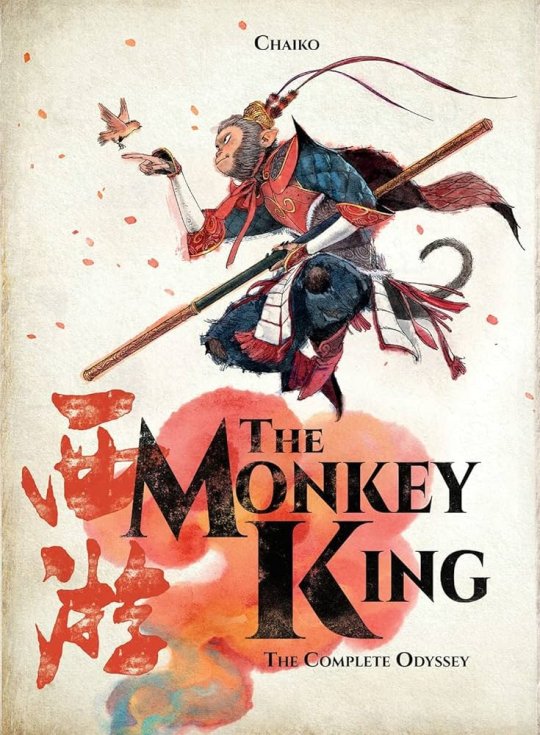
The prevailing and dominant theory among Asian scholars is ...yeah, likely.
That character, Hanuman, king of the monkeys (the monkey people -Vanaras- of Vedic myth!).
The story follows a Buddhist monk who is accompanied by Sun Wukong and others to travel west to India to obtain sacred Buddhist sutras. Many of their powers and personality traits are similar as well.
We know that Vedic god such as Indra have made their way as far as Japan to take root and be worshipped because of the spread of Buddhism.
As I've talked about before and is shown in texts such as the journey's of Ibn Battuta / Ibn Fadlan, storytelling was a weapon and powerful tool for idea transfer--propagation. Philosophy was huge in the old world - and places such as Nalanda - the first residential university in the world - invited scholars from all over such as Greeks from the west, and the Japanese. Buddhism became a vehicle for trading things such as: martial arts information, medicine, sciences, and of course, myths and stories.
However, as with stories, people usually altered/coopted elements and molded them to better suit their cultures and fancy. That's a thing as old as time. I've shared how the panchatantra stories and jatka tales are thought to be the inspiration for nearly 30-50 percent of all nursery rhymes, ballads, "fairy tales".
Anyways back to this theory - Chinese Indologist Professor Liu Anwu of Peking University has dedicated chapters to the comparisons (in one of his works) to further break down this theory focusing on consistent and or similar depictions of beats in Journey to the West that of Rama's story in Ramayama and the Buddhist sutras.
Even though today the story of Sun Wukong is a wholly Chinese story - it's important to note the power of oral storytelling and how it travelled evolved over thousands of years, and, just as important, the vehicles it used to do so. Not just storytellers and philosophers and travelers but religion! Philosophy!
This is a theme heavily commented on and shown in Tales of Tremaine, which is my love letter and sort of self PhD. in comparative storytelling, mythology, and story foundry through an Asiatic lens (hence a silk road analog) stretching along a similar route the silk road did from damn near as far as you can east (complete with the oceanic routes) to as west as old venezia, portugal, and spain.
Also note: this is the most popular theory atm, but the operative word is theory. Experts likely far better than you, Internet, so chill before you comment, are still debating this. I know last week some of you were doctors in sociopolitical relations, the music industry before that, and then you were leading virologists before that. Spare us simpler folks from your mighty genius just now and sit down.
The point here is the beauty of stories and their ability to travel and morph and comment on themes/points ideologies important to cultures while being entertaining and showing that humans like certain universal moments, beats, archetypes, tropes, and progressions in tales.
Now, is that because we've naturally been predisposed liking them, or the opposite in that everyone went, yo, i dig this, took it home and someone else went, this is cool but needs to be more US (insert culture) and retold it. And thus...timemachine noises speed up. Here we are today?
You might not know that about 35,000 Chinese words ( I said this instead of Mandarin because they don't just show up in one language) are derived from Sanskrit as well as Pali (a Middle Indo-Aryan Liturgical Language -- meaning language of sacredness/religious use, in this case connected to sacred Buddhist texts). It is important to make the distinction, because, Internet!
Sanskrit did not SHAPE the Chinese languages. They evolved on their own. This is just a commentary on how words/stories shaped over travel in this case strongly through the spread of Buddhism.
Religion was the mover.
Back from quick bathroom break. Going to add again - INSPIRED is the keyword here.
INSPIRED.
Sun Wukong is his own mythos/character. Influence doesn't nor can claim dominion over everything in a later tale. Sun Wukong has gone on himself to inspire legends and characters Outside of China - re: most famously and legendary?
Son Goku - who is openly a Sun Wukong inspired character.
...hell, tbh, he might be the most famous monkey inspired super powered character now. Dude makes soccer stadiums air his fights. @_@.

#monkey king#monkey king journey to the west#hanuman#buddhist#buddhist monk#sun wukong#vedic gods#Japan#China#chinese legend#storytelling#mythology#myths and legends#asian mythology#mandarin#Sanskrit#pali#chinese language#dbz#dragon ball#dragon ball z#inspired#inspired by#the silk road#silk road retelling#philosophy#philosophers#journey to the west#fairy tales#nursery rhymes
36 notes
·
View notes
Text
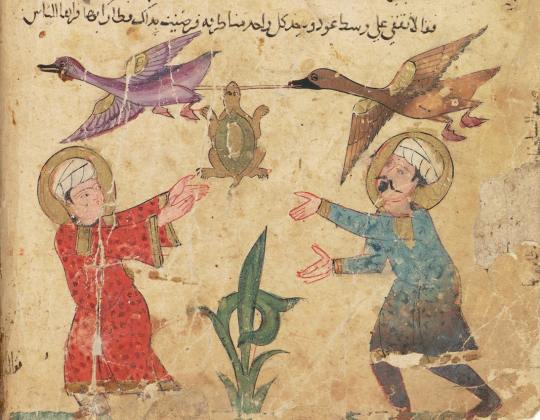
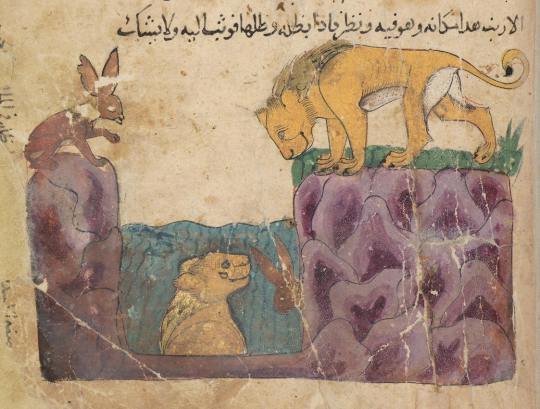
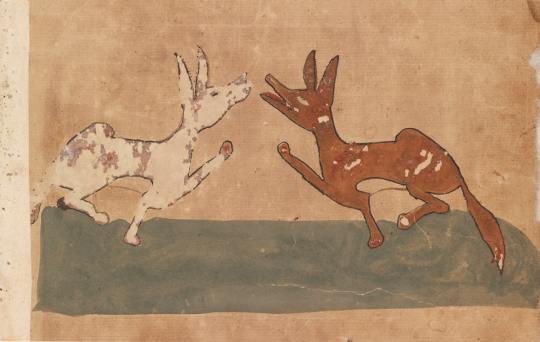
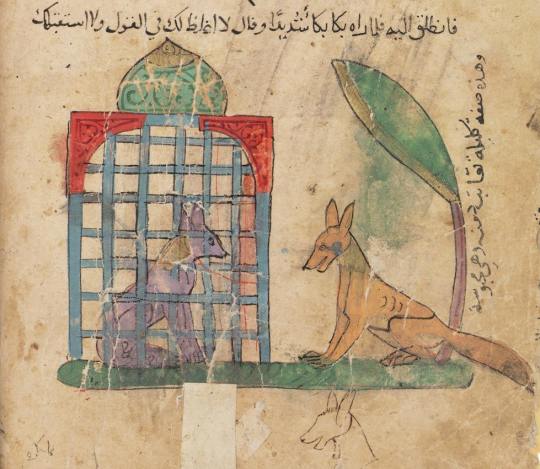
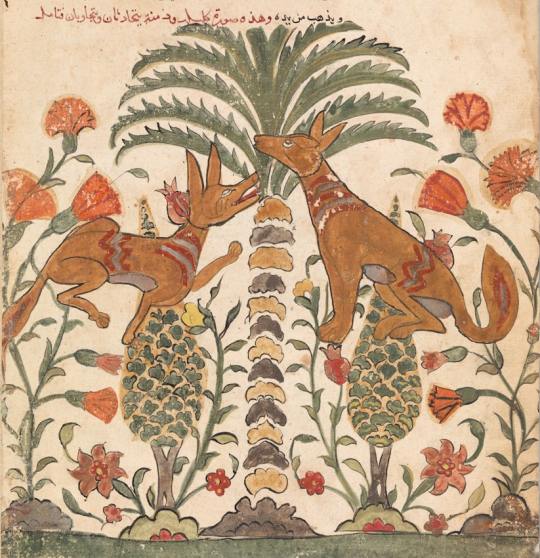

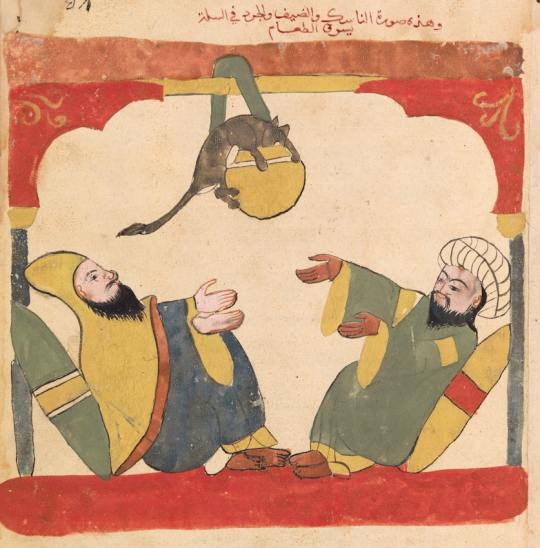
Travelling Tales
Kalīlah wa-Dimnah and the Animal Fable
By Marina Warner
Influencing numerous later animal tales told around the world, the 8th-century Arabic fables of Ibn al-Muqaffaʿ’s Kalīlah wa-Dimnah also inspired a rich visual tradition of illustration: jackals on trial, airborne turtles, and unlikely alliances between species. Marina Warner follows these stories as they wander and change across time and place, celebrating their sharp political observation and stimulating mix of humour, earnesty, and melancholy.
Kalīlah and Dimnah are two jackals, wily and ambitious, one virtuous and the other rather less so, who give their names to the eponymous cycle of animal fables in Arabic that is framed by the stories of their friendship, adventures, and mishaps.1 The collection bears a family likeness to Aesop’s Fables and to other classics of moral exempla, but the volumes vary one from one another and even when the stories coincide, they aren’t identical. They share certain generic features: animal protagonists above all (lions, wolves, monkeys, asses, mice, magpies); a narrative of braided tales passing between speakers, often imbricating one story inside the other; and a prevailing tone of tragi-comic moralising coupled with world-weary wisdom about the folly and the treachery of humans.
Most of all, the story of the two jackals Kalīlah and Dimnah, and the tales told in the course of their adventures, are travelling tales, which have been travelling for a long while, migrating from language to language, culture to culture, religion to religion. The Arabic stories’ rich history ranges from Benares to Baghdad and Basra and Rome and beyond, appearing in numerous iterations over centuries, moving across borders, carrying the sparkling hope and mordant cynicism, the canniness and the wit of a form of wisdom literature that originated in the Sanskrit Panchatantra (The Five Books, or Five Discourses) and the Mahabharata, sometime in the second century BCE. Two significant branches grew from this trunk: first, a collection often attributed to a legendary Indian sage, known as Bidpay or Pilpay, and second, the Arabic branch, beginning in the eighth century with the work of the scholar Ibn al-Muqaffa‘ (d. 139/757), who translated and compiled Kalīlah wa-Dimnah. Ibn al-Muqaffa‘ worked from a lost Pehlevi (Middle Persian) composition by a writer called Barzahwayh, which he treated freely, mixing into the Panchatantra’s original fables four more tales, and a highly circumstantial and persuasive explanation of how the manuscript was obtained; he also added a crucial dramatic chapter about Dimnah’s trial, self-defence, and ultimate punishment.
Read the whole essay https://publicdomainreview.org/essay/travelling-tales/
26 notes
·
View notes
Text
Does anyone remember reading panchatantra in childhood?
Has anyone read panchatantra in childhood?
For me it is the first memory of reading books and stories. My mother used to recite me and my brother stories from it for dinner time. The book was so pretty, so intriguing. I can still remember how the book cover looked like.
Looking back, now I understand that Panchatantra and other books like it is what made me love reading books.
#also books like champak#or chacha chaudhary#and many others I can't remember now#they are like a childhood treasure#books#desiblr#desi tumblr#bookblr
5 notes
·
View notes
Text
“And so, as I stand today to receive a peace prize, I ask myself, “What does the world of fable have to tell us about peace?”
The news is not very good. Homer tells us that peace comes after a decade of war, when everyone we care about is dead and Troy has been destroyed. The Norse myths tell us that peace comes after the Ragnarök, the Twilight of the Gods, when the gods destroy their traditional foes but are also destroyed by them. And the “Panchatantra” tells us that peace—the death of the owls and the victory of the crows—is achieved only through an act of treachery. To abandon the legends of the past for a moment and look at this summer’s twin fables, the film “Oppenheimer” reminds us that peace came only after two atom bombs, Little Boy and Fat Man, were dropped on the people of Hiroshima and Nagasaki; while the box-office monster called “Barbie” makes clear that unbroken peace and undiluted happiness, in a world where every day is perfect, exist only in pink plastic.
And here we are gathered to speak of peace, when war is raging not very far away—a war born of one man’s tyranny and greed for power and conquest—and when another bitter conflict has exploded in Israel and the Gaza Strip. Peace, right now, feels like a fantasy born of a narcotic smoked in a pipe. Even the meaning of the word is a thing on which the combatants cannot agree. Peace, for Ukraine, means more than a cessation of hostilities. It means, as it must mean, a restoration of seized territory and a guarantee of its sovereignty. Peace, for Ukraine’s enemy, means a Ukrainian surrender. The same word, with two incompatible definitions. Peace for Israel and for Palestinians feels even further away.
(…)
If my work has been influenced by fables, there is also something decidedly fabulist about a peace prize. I like the idea that peace itself might be the prize—that this jury of wise benefactors is so infinitely powerful that they are able to bestow upon a single individual, and no more, one year’s award of peace. True, blessed peace, not trivial contentment, paix ordinaire, but a fine vintage of Pax Frankfurtiana, a whole year’s supply of it, delivered to your door, elegantly bottled. That’s an award I’d be very happy to receive. I am even thinking of writing a story about it, “The Man Who Received Peace as a Prize.”
(…)
My fate, over the past many years, has been to drink from the bottle marked Freedom and therefore to write without any restraint those books that came to my mind to write, and now, as I am on the verge of publishing my twenty-second volume, I have to say that on twenty-one of those twenty-two occasions the elixir has been well worth drinking. On the remaining occasion, namely, the publication of my fourth novel, I learned—many of us learned—that freedom can create an equal and opposite reaction from the forces of unfreedom, and I learned, too, how to face the consequences of that reaction, and to continue, as best I could, to be as unfettered an artist as I had always wished to be. I learned, too, that many other writers and artists, exercising their freedom, also faced the forces of unfreedom, and that, in short, freedom can be a dangerous wine to drink. But that made it more necessary, more essential to defend. I confess there have been times when I’d rather have drunk the Peace elixir and spent my life sitting under a tree wearing a blissful, beatific smile, but that was not the bottle the peddler handed me.
We live in a time I did not think I would see in my lifetime, a time when freedom—and in particular freedom of expression, without which the world of books could not exist—is everywhere under attack from reactionary, authoritarian, populist, demagogic, narcissistic, careless voices; when places of education and libraries are subject to hostility and censorship; and when extremist religion and bigoted ideologies have begun to intrude in areas of life in which they do not belong. And there are also progressive voices being raised in favor of a new kind of bien-pensant censorship, one which appears virtuous, and which many people have begun to see as a virtue. So freedom is under pressure from the left as well as the right, the young as well as the old. This is something new, and made more complicated by our new tool of communication, the Internet, on which well-designed pages of malevolent lies sit side by side with the truth, and it is difficult for many people to tell which is which; and our social media, where the idea of freedom is every day abused to permit, very often, a kind of online mob rule, which the billionaire owners of these platforms seem increasingly willing to encourage—and to profit by.
What do we do about free speech when it is so widely abused? We should still do, with renewed vigor, what we have always needed to do: to answer bad speech with better speech, to counter false narratives with better narratives, to answer hate with love, and to believe that the truth can still succeed even in an age of lies. We must defend it fiercely and define it as broadly as possible, so, yes, we should of course defend speech that offends us; otherwise we are not defending free expression at all. Let a thousand and one voices speak in a thousand and one different ways.
To quote Cavafy, “the barbarians are coming today,” and what I do know is that the answer to philistinism is art, the answer to barbarianism is civilization, and in any war it may be that artists of all sorts—filmmakers, actors, singers, and, yes, those who practice the ancient art of the book—can still, together, turn the barbarians away from the gates.”
“The survey, conducted from October 19 to October 25, found that 70 percent of Russians would support Putin should he decide to end the conflict this week.
However, if ending the war would include Russia returning the territories that it has occupied and annexed throughout the conflict, only a third (34 percent) of respondents said they would support that decision.
(…)
In its latest poll, the Levada Center surveyed 1,608 people across Russia. The results suggest that 20 months into Putin's full-scale invasion of Ukraine, public support for the conflict has dropped significantly.
The results are significant given that stringent laws passed in Russia in March 2022 made criticizing the Russian military and the war in Ukraine illegal. Many are believed to answer public opinion polls on the topic dishonestly, fearing retribution.
(…)
An August poll by the Levada Center showed that just 38 percent of respondents "definitely" support the actions of Russia's armed forces in Ukraine.
That is in contrast to results from a February 2022 survey from the research organization, conducted when Putin launched his full-scale invasion of Ukraine. Results from that poll, which asked the same question, showed 48 percent of respondents said they "definitely" supported the army's actions in Ukraine.
Ukrainian President Volodymyr Zelensky has said on multiple occasions that he will not comply with the Kremlin's non-negotiable conditions for peace talks, including that Kyiv must accept the September 2022 annexation of four of its regions—Luhansk, Donetsk, Kherson and Zaporizhzhia—following referendums called by Putin that were deemed illegal by the international community.
Ukraine has said that any peace deal must make void Russia's annexations of its territory, and that the Black Sea peninsula of Crimea, which Putin annexed in 2014, must be reversed.
Zelensky has pushed a 10-step "peace formula," which includes radiation and nuclear safety; food security; energy security; the release of all prisoners and deported persons; implementation of the U.N. Charter and restoration of Ukraine's territorial integrity and the world order; withdrawal of Russian troops and cessation of hostilities; restoration of justice; countering ecocide; preventing escalation; and finally, confirmation of the end of the war.
Russia has maintained that any peace deal must include "the entry of four [Ukrainian] regions into Russia," something that Kyiv is unlikely to budge on.”

“The US and Israel are exploring options for the future of the Gaza Strip, including the possibility of a multinational force that may involve American troops if Israeli forces succeed in ousting Hamas, people familiar with the matter said.
The people said the conversations have been impelled by a sense of urgency to come up with a plan for the future of Gaza now that a ground invasion has begun. A second option would establish a peacekeeping force modeled on one that oversees a 1979 Egypt-Israel peace treaty, while a third would see Gaza put under temporary United Nations oversight.
(…)
“We can’t have a reversion to the status quo with Hamas running Gaza,” Blinken, who will travel to Israel on Friday, told the Senate Appropriations Committee. “We also can’t have — and the Israelis start with this proposition themselves — Israel running or controlling Gaza.”
(…)
Israeli officials have said repeatedly that they don’t intend to occupy Gaza, but they’ve also said that continued rule by Hamas is unacceptable after the Oct. 7 attack in which the group killed 1,400 Israelis and took more than 200 people hostage. There’s also little evidence that the Palestinian Authority, which governs the West Bank, would be willing or able to take over Gaza. Hamas has been designated a terrorist group by the US and the European Union.
Ophir Falk, a foreign policy adviser to Prime Minister Benjamin Netanyahu, said, “A number of options have been raised for the day after Hamas. The prerequisite for all of them is that Hamas be destroyed. Once Hamas is destroyed, all the options discussed are based on the premise that Gaza be demilitarized.”
All options hold political peril for President Joe Biden and for other nations, including Gulf States, not to mention Israel. Biden believes that putting even a small contingent of American troops in harm’s way could prove politically risky, according to a person familiar with his thinking, who added that the US isn’t close to making such a decision. It’s also not yet clear whether Arab states might be interested in participating, another person said.
Ultimately, Biden and other US officials say that an endpoint that involves a sovereign Palestinian state is necessary, but exactly how to reach that outcome has barely featured in discussions, either public or private. And Israel says its military operation could last months, and will result in a buffer zone around Gaza.
According to the people familiar with the matter, one option would grant temporary oversight to Gaza to countries from the region, backed by troops from the US, UK, Germany and France. Ideally, it would also include representation from Arab nations such as Saudi Arabia or the United Arab Emirates, the people said.
A second option is a peacekeeping force modeled on the Multinational Force and Observers group that operates on and around the Sinai peninsula, enforcing the terms of the peace treaty between Egypt and Israel. Israel believes that this idea is worthy of consideration, according to a person familiar with the matter.
A third option would be temporary governance of the strip under a United Nations umbrella. This would have the advantage of the legitimacy bestowed by the UN, but Israel views it as impractical, according to a person familiar with Israel’s thinking, who added that Israel believes that little good has come from the world body.
Earlier this month, Israeli Minister Benny Gantz labeled UN Secretary-General Antonio Guterres a “terror apologist” after Guterres argued that the Oct. 7 attacks “did not happen in a vacuum.”
Several former officials and outside groups have already begun discussions with the US and Israel, and floated possible plans. One came from the Washington Institute for Near East Policy, which called for a Palestinian-run interim administration, with the UN Relief and Works Agency continuing to provide food, heath and education.”
#rushdie#salman rushdie#peace#peace prize#german book trade#war#russia#ukraine#israel#hamas#palestine#gaza#wwiii#world war 3
12 notes
·
View notes
Video
youtube
|| పిల్లి సహాయం ||
అనగనగా ఒక వూళ్ళో ఒక వర్తకుడు. అతనికి ముగ్గురు కొడుకులు. ఒక రోజున అతను ముగ్గురిని పిలిచి, తన ఆస్తిని ఈ విధంగా పంచిపెట్టాడు: వ్యాపారం అంతా మొదటివాడికి, రెండవవాడికి గాడిదను, మూడవవాడికి పిల్లినీ. పెద్దవాడూ, రెండోవాడూ మాటాడలేదు కానీ, కడపటివాడు మాత్రం తన వంతుకు ఎందుకూ పనికిరాని పిల్లి వచ్చింది కదా అని చాలా విచారించాడు. అతని విచారం చూసి, " ఓయి పిచ్చివాడా!
#chinnanatichandamamakathalu #chandamama #chandamamakathalu #chandamamastories #neethikathalu #neethikathalutelugu #neethikathalutelugustories #telugustories #telugustory #telugulokathalu #telugunoval #teluguaudiobook #telugumoral #telugumoralstories #stories #storiesforkids #storiesforchildren #storiesforall #storiesintelugu #MoralStory #moralstories #moralstoriesforkids #moralstoriesforchildren #bedtimestory #bedtimestories #bedtimestoriesforkids #bedtimestoriesforchildren #bedtimestoriesintelugu #panchatantrakathalu #panchatantraneethikathalu #subscribe #subscribenow
#youtube#chinnanatichandamamakathalu#chandamamastories#chandamama#chandamamakathalu#panchatantra#panchatantrakathalu#panchatantrastories#panchatantraneethikathalu#neethikathalu#neethikathaluintelugu#neethikathalutelugu#neethikathalutelugustories#telugustories#telugustoriesforkids#telugumoralstories#telugustoriesforchildren#telugumoralstoriesforkids#stories#story#storiesintelugu#bedtimestories#storiesforkids#storiesforadults#bedtimestoriesforkids#bedtimestoriesforchildren#bedtimechandamamastories#subscribe#subscribenow#viralvideo
0 notes
Text
Moral Tales From Panchtantra: Timeless Stories For Children From Ancient India
A Timeless Tapestry of Wisdom: A Review of “Moral Tales From Panchtantra” “Moral Tales From Panchtantra” is not just a collection of stories; it’s a treasure trove of ancient Indian wisdom, skillfully woven into captivating narratives for children. This timeless classic, originating from the ancient Sanskrit text “Panchatantra,” offers a delightful blend of fables, animal tales, and witty…

View On WordPress
0 notes
Text
0 notes